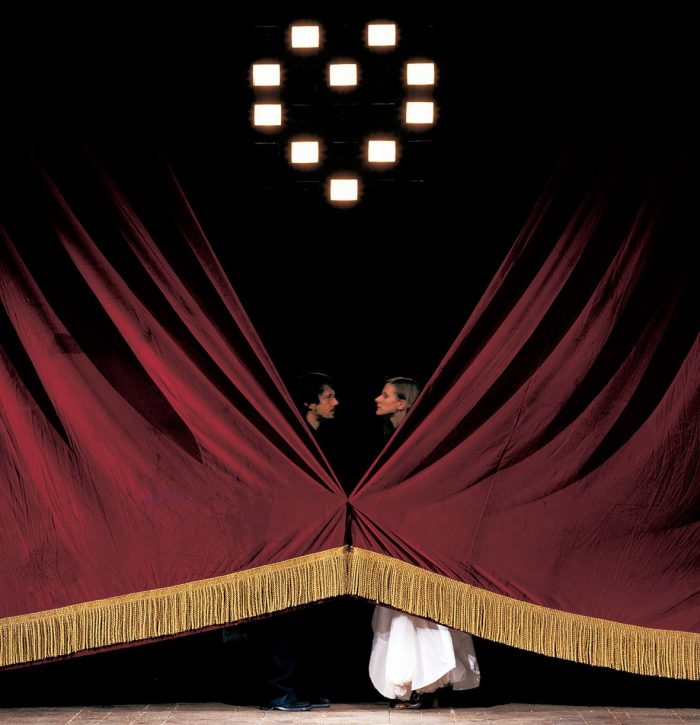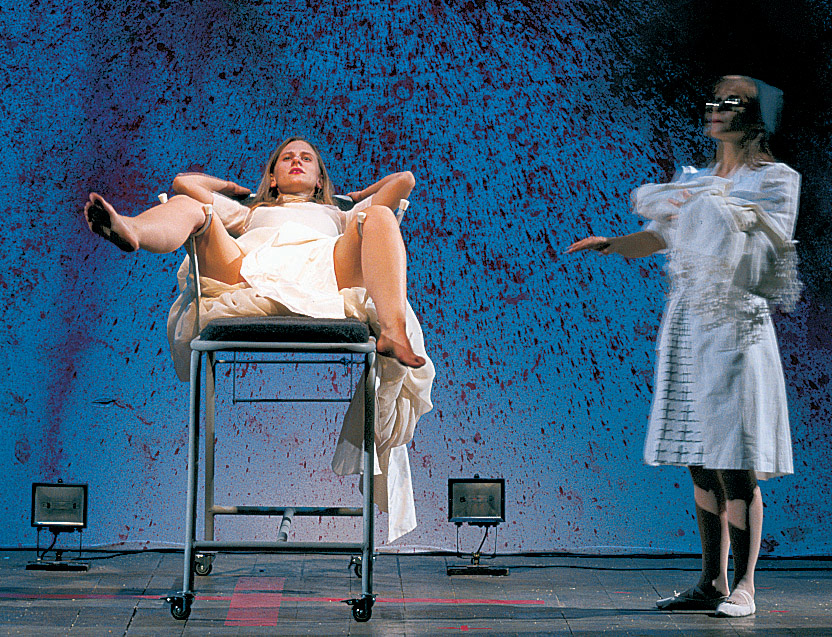Aqua Marina
or three actors, curtain and sound devices
Ubu Award 2005 for the best supporting actress (Francesca Mazza)
- Concept: Chiara Lagani, Luigi de Angelis
- Direction, lighting design, sound devices: Luigi de Angelis
- Dramaturgy and costumes: Chiara Lagani
- Set: Luigi de Angelis, Antonio Rinaldi
- Music: Giacinto Scelsi, Canti del Capricorno
- With: Marco Cavalcoli, Chiara Lagani, Francesca Mazza
- Scene movements: Antonio Rinaldi
- Scenery and technical realization: Antonio Rinaldi with Giovanni Cavalcoli, Lia Pari
- Decorations: Sara Masotti
- Literature detective: Margherita Crepax
- Dancing masters: Edoardo Sebastiani, Elisabetta Ragazzini
- Tailoring: Laura Graziani Alta Moda
- Promotion: Sergio Carioli, Marco Molduzzi
- Press office: Marco Molduzzi
- Logistics: Sergio Carioli
- Administration: Antonietta Sciancalepore, Marco Cavalcoli
- Production: Fanny & Alexander and Festival delle Colline Torinesi, with the cooperation of Accademia Perduta / Romagna Teatri, with the patronage of Regione Emilia-Romagna, Provincia di Ravenna, Comune di Ravenna, with the patronage and cooperation of Comune di Bagnacavallo, with the contribution of Romagna Acque – Società delle Fonti Spa and Hera Ravenna
- With thanks to Prof. Arnaldo Benini, Claudia Losi, Elisa Eusebi, Filippo Farneti, Renzo Palmieri, Farmacia Dradi
- With special thanks to Stefano Bartezzaghi, alchemist of alphabets
- The cameo of Ophelia by Francesca Mazza is a quotation from Leo de Berardinis’ shows.
Year : 2005
The excerpts from Vladimir Nabokov’s works, translated in Italian by Margherita Crepax, are used in accordance with “The Vladimir Nabokov Estate”
… for the human brain can become the best torture house
of all those it has invented, established and used in millions of years,
in millions of lands, on millions of howling creatures.
(V. Nabokov)
Just imagine to find yourself inside a brain. As a matter of fact, this brain is a delightful theatre where some obsessions will take the shape of a play. Just try and imagine this little theatre – no matter how obscene and dramatic – like it was a clinic, a mental home at the heart of a drama. The drama we will watch is the very one appearing in the first three chapters of “Ada”, the famous novel of our life. It’s the story of Aqua, erratic adolescent, affllicted by a syndrome of existalienation as a consequence of the great disaster afflicting the whole mankind and enigmatically changing the very code of this tale.
But it’s also the story of Marina, Aqua’s sister and actress, yes, the Prima Donna in our drama. It will be a story of love and jealousy. In fact both the sisters will love the very same man, or rather they will be haunted by the very same demon, precisely Demon, Aqua’s husband and Marina’s lover respectively. Voilà, here is the tangle! And here we are again inside the little theatre! Aqua will be placed at the centre of a perfectly ecstatic role, the victim’s one, object of violence and love by the world and the world of theatre.
Now it’s up to you and you only to ascertain the following facts:
1. If this brain is more similar in theatre than the clinic or vice versa.
2. If Marina’s wickedness is more harmful than Aqua’s goodness.
3. Which sister gave birth to that baby we keep on hearing about; then if the abovementioned baby has ever truly existed.
4. Which the “EL code” is , maybe the entangled plot’s exact solution, a kind of final test, in short; in other words, what is indispensable to understand and negligible to neglect.
5. In the end, who’s really living and who’s really dead.
Nevertheless, we cannot leave aside one last and fundamental piece of information we forgot to give, but which maybe you’ve already had a vague perception of: this show will be a real detective play, where the mostly desired role, the detective’s one, will be assigned to you and you only.
PAST DATES
February 11/12/13, 2015 | Bagnacavallo (RA), Teatro Goldoni, NOBODADDY
April 6, 2005 | Urbino, Teatro Sanzio
June 14/15, 2005 | Turin, Teatro Gobetti, Festival delle Colline Torinesi
July 26, 2018 | Volterra, Teatro Persio Flacco, Carte Blanche
April 20, 2006 | Cervia (RA), Teatro Comunale
June 22/24, 2006 | Turin, Teatro Gobetti, Festival delle Colline Torinesi
April 2, 2007 | Milan, Piccolo Teatro Studio
ph. Enrico Fedrigoli

